In this article:
Maintaining good personal hygiene is the best way to prevent body odor. This includes the use of antibacterial soap when bathing or showering to keep the odor-causing bacteria in check, especially in the feet, armpits, and genital area.
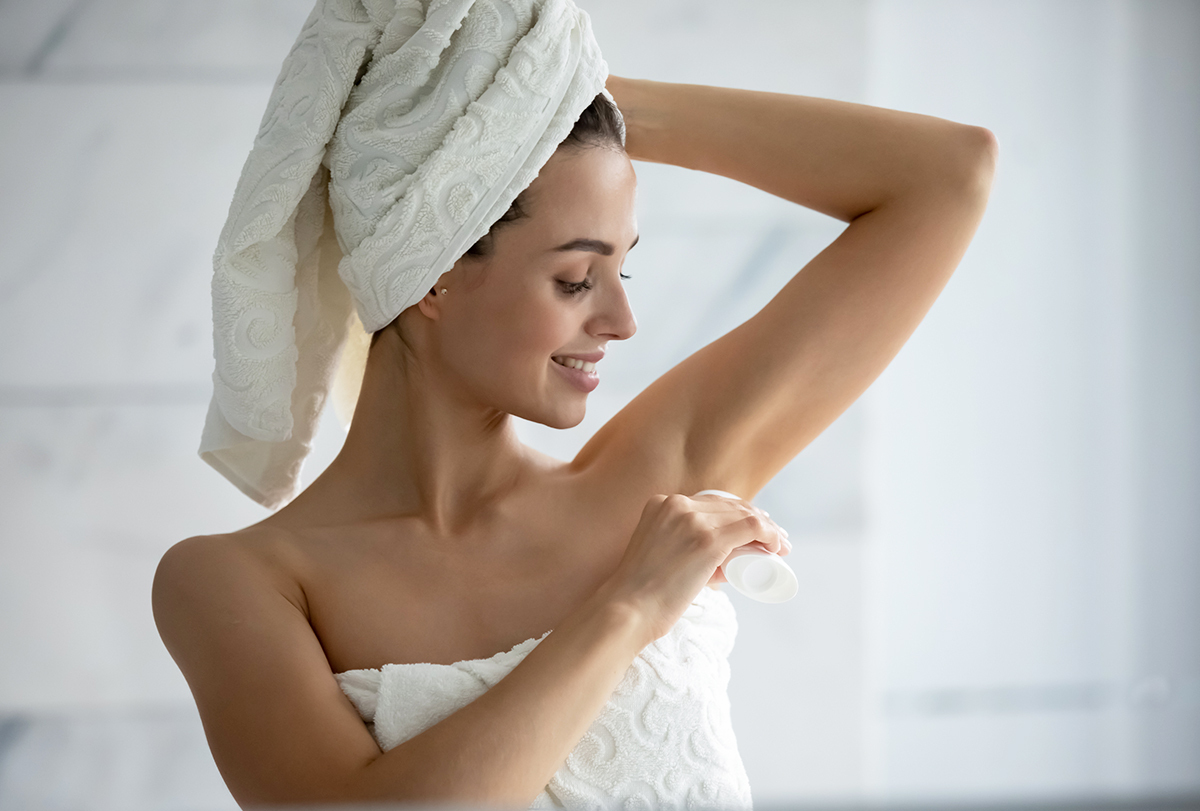
Additionally, you may use deodorants for a fresh smell and antiperspirants to help control sweating.
Home Treatments to Keep Your Body From Smelling Bad
Regular use of the following personal hygiene products can help control body odor.
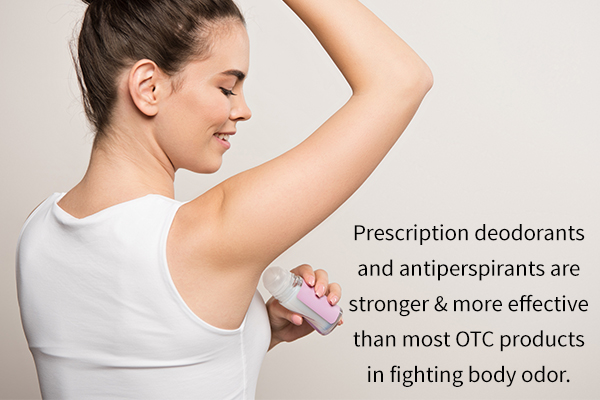
1. Wash your body with an antibacterial soap
Regular showers are a key part of hygiene, and using antibacterial soap or body wash during bathing can be effective in preventing body odor. Products such as Dial and benzoyl peroxide help remove the bacteria that convert sweat into stink.
2. Spray on some deodorant
Deodorant roll-ons and sprays containing isopropyl palmitate, aluminum chlorohydrate, and Cyclomethicone help lower the bacterial growth rate. Additionally, the ingredient 5-methyl furfural targets malodor-causing bacteria present in the skin biome specifically. (1)
3. Apply an antiperspirant
Antiperspirants with 10%–15% aluminum chloride work by blocking the sweat glands, therefore preventing sweating. These are generally applied to dry skin at night.
However, some studies suggest that antiperspirants support the growth of Actinobacteria, which in turn stimulate the odor-causing bacteria. (2) Therefore, it is suggested to consult a medical practitioner before using any antiperspirant product on your skin.
Home Remedies to Reduce Body Odor
Disclaimer: Before using any new topical ingredient on your skin, you must patch test it on the underside of your arm to rule out any adverse reactions like stinging, burns, rashes, etc. If you experience any kind of irritation, the remedy is not for you.
Needless to say, people who are allergic to any of the ingredients in the remedy should not consider it at all. People with active dermatological conditions, wounds, lesions, or generally sensitive skin should avoid these topical remedies as well.
Here are some topical agents that can work as natural deodorants for curbing body odor:
1. Baking soda
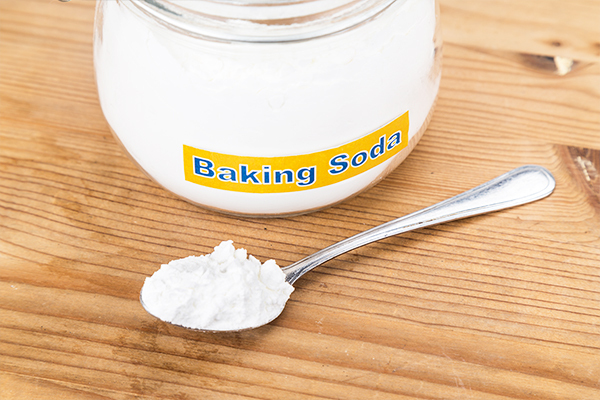
Baking soda or sodium bicarbonate is a common household ingredient that has been popularly used for reducing body odor, but there are no scientific studies to verify its effectiveness in this regard.
Many users have reported positive results after applying baking soda over their sweaty regions claiming that it helps soak in the perspiration, but some have reported adverse effects as well. So, you must exercise your discretion and conduct a patch test before using this remedy.
Caution: The alkaline nature of this ingredient can disrupt your skin’s normal pH if used excessively, and invite further skin damage.
How to use:
Mix a few drops of lukewarm water with one-fourth tablespoon of baking soda to form a thick paste, and apply it to your underarm for 15–20 minutes before washing it off. For the sake of convenience, you can use this remedy before taking a bath.
Baking soda may work as a natural absorbent that can help reduce excessive sweating in problem areas, while also disinfecting the site to reduce body odor.
2. Lemon juice
Lemon juice is another remedy that has gained a lot of traction among general users and is often cited on internet forums as a means to manage body odor.
The strong citrusy smell of lime may help camouflage the stench of sweat to some degree, but it will wear off after a while. More importantly, lemon juice exhibits antioxidant and antibacterial activity which can help diminish the foul smell too.
However, lime juice is acidic and can irritate or dry out your skin if overused. Minor stinging should not be a cause of concern, but you must discontinue the remedy if you develop a rash or prolonged discomfort.
How to use:
- Apply a few drops of lime juice or rub a cut lemon all over your armpits, let it sit for a few hours, and take a bath afterwards. You can do this before every other bath.
- Alternatively, you can add some lemon juice to your bath water and let your body soak in it.
Topical use of lemon juice on sweat zones may help reduce perspiration and curb the growth of malodorous bacteria, but these effects are usually temporary and disappear once you stop using the remedy.
3. Essential oils
Essential oils are sweet-smelling liquids extracted from a variety of healing plants that may help tackle body odor, although there aren’t enough studies to support this claim.
Some of the most sought after essential oils that can help deodorize your body include tea tree oil, chamomile oil, peppermint oil, and thyme oil. But bear in mind, these potent liquids must be diluted in a carrier oil or water before application since they are too strong at their original concentration. (3)
How to use:
- Add a few drops of fragrant essential oils in your bathtub full of water, and let your body marinate in it.
- Add a few drops of essential oils in a diffuser and let your body soak in the aromatic vapors.
It is suggested that these therapeutic oils can help kill the odor-producing bacteria and dampen the smell of sweat on account of their strong scent and disinfectant potential.
Lifestyle Changes to Reduce Body Odor
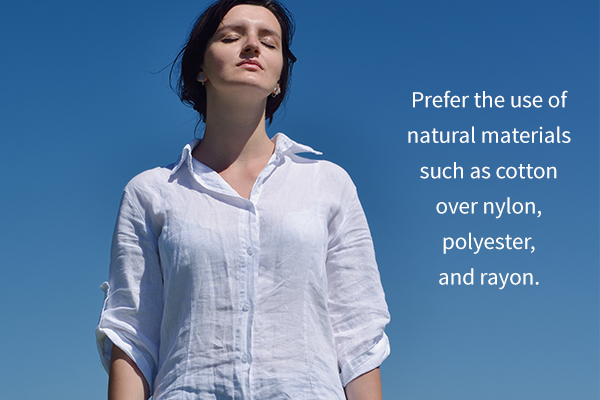
The following self-care tips help in preventing and reducing body malodor:
1. Shave or wax
A large number of secretory glands are present in hair-covered body parts such as the pubic area and armpits. The hair traps the sweat, creating a bacterial breeding ground. Therefore, removing or trimming the hair in these areas can help reduce malodor.
2. Wear breathable fabrics
Opt for natural materials such as cotton over nylon, polyester, and rayon. Natural fabrics allow air to pass and thus enable the evaporation of sweat, whereas synthetic fabrics trap sweat, thus facilitating the growth of malodor-causing bacteria.
Moreover, moisture-wicking fabrics should be used while exercising.
3. Change your diet
Increased consumption of citrus fruits and fiber-rich foods such as lentils, beans, and peas helps lower body odor production.
Additionally, herbal teas such as peppermint aid digestion and prevent the accumulation of food in the system. You may also use floral jasmine tea for a fresh smell.
4. Limit the intake of cruciferous vegetables
Cruciferous vegetables have high sulfur content. Sulfur breaks down into hydrogen sulfide, producing a rotten egg smell.
5. Stay hydrated
Increasing your water uptake helps dilute your sweat. As a result, a lower amount of amino acids is available for the bacteria to produce odor.
6. Shower daily
Washing and drying the body regularly are essential to curb the growth of malodor-causing bacteria since bacteria grow on damp places.
Daily baths, along with the use of antiperspirants and cosmetics, help lower sweat production while controlling the growth of microbes and their metabolic activities. (4)
7. Wear clean clothes
Clothes produce a warm, moist environment on the skin for bacterial growth, leading to malodor, fabric deterioration, staining, irritation, skin infections, or allergies. (5)
Moreover, the sweat, along with the malodor and bacteria, also gets trapped on the fabric. Therefore, wearing fresh clothes is essential to prevent malodor. It is recommended to use natural fabrics such as cotton and linen for better sweat absorption.
8. Avoid tobacco
Tobacco use can stimulate excessive sweating in the body.
9. Refrain from consuming excessive alcohol
The body metabolizes alcohol to produce acetate, which contributes a sweet smell to body odor.
Are Deodorants and Antiperspirant Deodorants Different?
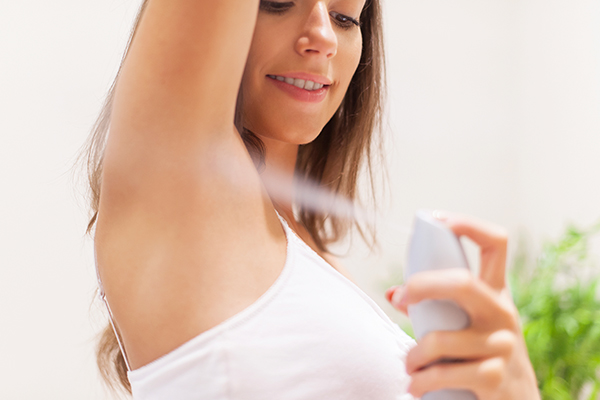
Deodorants only help cover up the smell of sweat coming from the body through its fragrance or scent.
Antiperspirant products, on the other hand, contain chemicals that dry up the sweat and prevent further sweating, while giving off a fresher scent.
Note: Over-the-counter antiperspirants and deodorants may not be adequate for people that sweat heavily or have strong malodor. (6) In such cases, it is suggested to consult a doctor for reliable prescription products or treatments.
Final Word
Various measures can control sweating and body odor. One method may work for an individual, but a combination of treatments may be needed by another.
It is vital to consult your physician on the steps you can take to prevent body odor. Additionally, inform them about any OTC medications, herbal supplements, or vitamins you are taking, as these products can interact with each other.

- Was this article helpful?
- YES, THANKS!NOT REALLY


